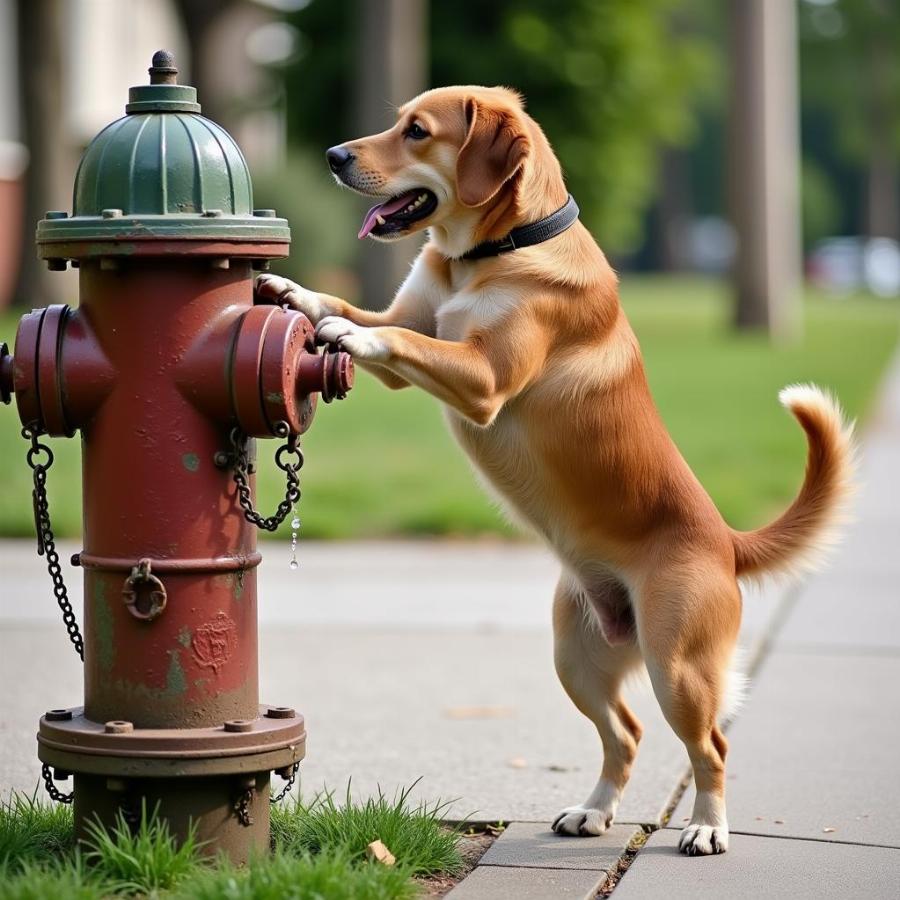Male dog marking can be a frustrating issue for pet owners. Whether it’s inside the house or on your favorite walk, that persistent leg-lifting and spraying can be a real nuisance. Understanding why your dog marks is the first step to addressing the behavior. This comprehensive guide will delve into the reasons behind marking, provide practical solutions to curb this behavior, and offer valuable insights to help you and your furry friend achieve a harmonious living environment.
Understanding Why Dogs Mark
Dogs mark their territory using urine, leaving a scent signal for other dogs. While it’s a natural instinct, excessive marking can become problematic. For male dogs, marking is often driven by hormones, especially testosterone. It’s a way of communicating their presence, sexual maturity, and social status. Even neutered dogs can mark, although it’s typically less frequent and intense. Anxiety, stress, or changes in the environment can also trigger marking behavior. New pets, visitors, or even a new piece of furniture can upset the balance and lead to increased marking.
Practical Solutions to Stop Marking
Addressing marking behavior requires a multi-pronged approach that combines training, environmental management, and sometimes, medical intervention. Consistency is key, and patience is essential.
Neutering Your Dog
One of the most effective ways to reduce marking is to have your male dog neutered. This procedure significantly reduces testosterone levels, which in turn diminishes the urge to mark. While neutering doesn’t eliminate marking entirely, it often makes it less frequent and less intense.
Training and Behavior Modification
Training plays a crucial role in curbing marking behavior. Positive reinforcement techniques, such as rewarding your dog when he eliminates in designated areas, are highly effective. Interrupt the marking behavior as soon as you see it happening with a firm “No!” and redirect him to the appropriate spot. how do you get a male dog to stop marking offers additional tips on training.
Environmental Management
Creating a calm and predictable environment can also help reduce stress-induced marking. Ensure your dog has a safe and secure space where he feels comfortable. Cleaning previously marked areas thoroughly with an enzymatic cleaner is essential to eliminate the scent and discourage re-marking.
Medical Considerations
In some cases, marking can be a sign of an underlying medical condition, such as a urinary tract infection. If your dog suddenly starts marking more frequently, consult your veterinarian to rule out any medical issues.
 Male Dog Marking Behavior
Male Dog Marking Behavior
How Do I Stop My Dog From Marking in the House?
Stopping indoor marking requires diligence and a combination of the strategies mentioned above. Confine your dog to a smaller area of the house when you can’t supervise him closely. This will limit his opportunities to mark. Thoroughly clean any marked areas with an enzymatic cleaner to eliminate the scent. how to break a dog from marking provides specific strategies for dealing with indoor marking.
Why is My Neutered Dog Still Marking?
While neutering significantly reduces marking, it doesn’t always eliminate it completely. Some neutered dogs continue to mark out of habit or due to other factors like stress or territoriality. If your neutered dog is still marking excessively, consult with a veterinarian or a certified professional dog trainer.
Can I Use Deterrents to Stop Marking?
There are various deterrents available, such as sprays and ultrasonic devices. However, these are not always effective and may even cause more anxiety. Focus on positive reinforcement methods and addressing the underlying cause of the marking. Consider consulting a professional dog trainer for personalized guidance.
What if My Dog Starts Marking More Frequently?
Sudden changes in marking behavior can sometimes indicate a medical problem. If your dog suddenly starts marking more frequently than usual, consult your veterinarian to rule out any underlying medical conditions, such as a urinary tract infection or bladder stones. can a neutered dog still lock with a female addresses another common concern related to male dog behavior.
Conclusion
Stopping a male dog from marking requires patience, understanding, and a consistent approach. By combining training, environmental management, and addressing any potential medical concerns, you can effectively manage this behavior and create a more harmonious living environment for both you and your furry companion. Remember, consistency is key, and professional guidance can be invaluable. Addressing the underlying cause of the marking, rather than just treating the symptom, is crucial for long-term success.
FAQ
- Is marking more common in male dogs? Yes, marking is more common in male dogs due to hormonal influences.
- Will neutering always stop marking? While neutering significantly reduces marking, it doesn’t always eliminate it completely.
- Can anxiety cause marking? Yes, stress, anxiety, and changes in the environment can trigger marking behavior.
- What should I do if my dog suddenly starts marking more? Consult your veterinarian to rule out any underlying medical conditions.
- Are there any home remedies to stop marking? While some home remedies exist, it’s best to consult with a veterinarian or professional dog trainer.
- How can I clean up dog urine effectively? Use an enzymatic cleaner specifically designed for pet urine to eliminate the odor completely.
- Can training help with marking behavior? Yes, positive reinforcement training and behavior modification techniques are essential for addressing marking.
Further Reading
- Dog Names for Female Dachshunds: dog names female dachshund
- Male Pit Bull Dog Names: male pit bull dog names
Beaut Dogs is your trusted source for all things related to dog ownership, providing expert advice and guidance on every aspect of caring for your canine companion. From breed selection to training and nutrition, Beaut Dogs offers a wealth of information to help you navigate the joys and challenges of dog ownership. When you need personalized support, email us at [email protected] to get detailed and accurate answers from Beaut Dogs. Visit https://beautdogs.com today to learn more!